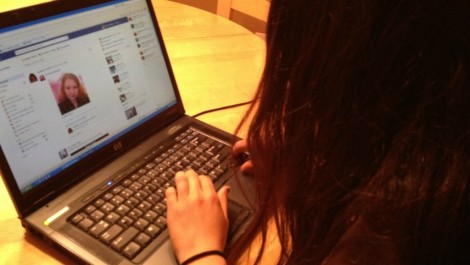Social media plays significant role in student life
May 15, 2012

- Facebook, Twitter and other forms of social media act as essential modes of communication and distractions to Wayland students as their dependence on social media increases.
A bloodshot pair of eyes are glued to a glowing blue screen where the time in the corner says 12:36 a.m. Meanwhile, a neglected textbook is spread open beside the keyboard. Sound familiar?
Many students at Wayland High School find that their use of social media easily distracts them from academics and could be causing their grades to drop.
Over the past few years, a variety of social media websites and apps have become popular, and practically every student at Wayland High School uses some form of social media. The most prevalent social media at Wayland High School is Facebook, followed by Twitter, Instagram, Tumblr and Pinterest.
Not only do students use Facebook most often, they use it in a variety of ways. Facebook use includes stalking photos, emailing, chatting with friends and communicating with extracurricular activity groups.
Students feel obligated to have a Facebook page not just to keep in touch with friends, but also to communicate with classmates for school and extracurricular activities.
“For sports, you have to be in a Facebook group,” sophomore Sammy Karle said. “That’s where they put all their information. They don’t send out emails anymore.”
Script to Screen teacher Erin Dalbec explains that she supports students in her class using Facebook in a positive way; she finds it important for her class to communicate.
“It definitely helps with the planning and communicating. Since most students are using Facebook outside of class, that’s the only way I can get in touch with them. Students these days aren’t using email,” said Dalbec.
Students don’t use Twitter as often for schoolwork or extracurricular activities. Instead, students use Twitter to Tweet (post statuses) and read others’ Tweets. You can follow friends, celebrities, teams or anyone whose Tweets you like to read.
“I don’t really post anything on Twitter. I look at other people’s stuff,” sophomore Rex Provost said. “I don’t follow Kim Kardashian; I follow people with interesting thoughts.”
Instagram, Tumblr and Pinterest all involve self-expression by posting images. Instagram is a mobile app for the iPhone, and Tumblr is a blogging site.
“Facebook has gotten boring. On Tumblr, you can express yourself. It’s fun,” said sophomore Kate Kaneiff.
School nurse Amy Schoeff and guidance counselor Jennifer Mast are concerned with the effects of social media on students’ academics. They both believe social media can become academically, emotionally and mentally harmful if used improperly.
“It almost has an addicting quality to it,” said Mast. “My sense is that a lot of students can’t ever shut it down, in which case if they’re studying or working on assignments, anytime they hear the beep of a Facebook message, it’s very, very distracting.”
Mast and Schoeff’s observations of social media’s effect on students’ schoolwork seem to ring true as students agreed that social media is distracting when trying to do work. Some students admit it can even completely prevent them from doing their schoolwork.
“It’s a means for procrastination,” said junior James Shaw. “Say you go on for five minutes; it turns into 30 minutes.”
“Sometimes when I have a reading to do for English, and I don’t feel like doing it, I go on Facebook,” senior Natalie Barone said.
Mast also believes social media can affect academics indirectly by creating mental and emotional distress, which in turn can cause students’ academics to suffer.
Cyberbullying is one way this emotional damage can be caused.
“Words can be so, so hurtful. It doesn’t matter if they’re said to somebody’s face or if they’re said online,” said Mast. “The world of bullying has gone cyber.”
According to Mast, students’ emotional and mental health is also affected by their relationships. Social media has a major impact on relationships because it is one of the most utilized forms of communication.
“If you’re communicating on Facebook, and you feel like that’s a conversation that you’re having with someone, then I think that’s a problem because it’s not,” said Schoeff. “You’re not getting facial expressions and hand gestures; you’re not getting the whole message. If people are using social media conversations instead of face to face or even over the phone conversations, then I think that’s a true problem with personal communication.”
Mast and Schoeff also had similar views regarding privacy on social media. They both warn students to be cautious when deciding what to post and to avoid posting anything personal.
“I do believe that it does more harm than good,” said Schoeff. “If you shared something personal with one other person, and all of a sudden the entire school, and world really, has access to it, it can be emotionally devastating. The whole privacy piece to me, it terrifies me.”
“If you wouldn’t say it to somebody in person, don’t put it online. It’s not a space for publicizing your entire life,” said Mast. “Recognize that while these sites may feel secure, they’re absolutely not.”

























Yours Truly • May 15, 2012 at 4:36 PM
Rexy sexy….